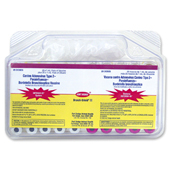Kennel cough, which is also known as
infectious tracheobronchitis, is a very common, contagious disease in
dogs. Several different microorganisms can cause the symptoms associated with kennel cough. The bacteria Bordetella bronchiseptica
is frequently to blame, but parainfluenza, canine influenza and other
viruses can play a role too.
Which Dogs Are Most at Risk?
Dogs that are stressed, have an underlying
respiratory disease, come in frequent contact with other dogs, and/or
have weak immune systems are at the greatest risk of coming down with
kennel cough. Boarding and grooming facilities, animal shelters,
and dog shows are all perfect places for the disease to spread, but
anywhere an infected dog can cough or sneeze, leaving behind infectious
bacteria and viruses for another dog to pick up, presents a risk.
"It is probably not too surprising that the primary symptom associated with this disease is a cough"
The Signs of Kennel Cough
It is probably not too surprising that
the primary symptom associated with this disease is a cough. The
cough tends not to produce a lot of phlegm, but it can occur frequently
throughout the day and last for weeks. As long as the infection
remains isolated to the windpipe and larger passageways for air, a dog
may not show any other signs of illness. If, however, the infection
spreads deeper into the lungs and causes pneumonia, the following clinical
signs may develop:
- Fever
- Loss of energy and appetite
- Nasal discharge
- Difficulty breathing
- A cough that produces a
lot of phlegm
Veterinary and Home Care for Kennel Cough

If you suspect your dog has kennel
cough and he appears healthy in all other regards, you can consider
letting him recover at home without a trip to the veterinarian.
Keep him away from other dogs to prevent him from spreading the disease
and reduce his activity level. Exercise can exacerbate your dog's
cough, irritating his throat and delaying his recovery. But, dogs
that appear to be getting worse rather than better or those that fail
to return to normal after a week or two should visit the veterinarian.
If after a thorough physical exam,
your vet thinks that kennel cough is the most likely diagnosis, he or
she may prescribe a cough
suppressant, pet meds, and possibly antibiotics to speed your dog's recovery. X-rays,
blood work, other diagnostic tests and more aggressive treatment may
be necessary if your dog fails to recover as expected or if your vet
suspects that pneumonia or another disease is to blame for your dog's
symptoms.
Prevention
Vaccines are available that protect
against some, but not all of the causes of kennel cough. Dogs
that have some contact with other dogs should be vaccinated for Bordetella
bronchiseptica annually, while those that frequent kennels, groomers
or shows can benefit from vaccination every six months. Talk to
your veterinarian about which other vaccines and what vaccination schedule
is best for your dog, and remember that even a well-protected dog is
not completely immune to kennel cough.
The above is provided for information purposes only and should not be used for the diagnosis or treatment of any condition.
This information does not cover all possible variables, conditions, reactions, or risks relating to any topic, medication, or product and should not
be considered complete. Certain products or medications may have risks and you should always consult your local veterinarian concerning the treatment of
your pet. Any trademarks are the property of their respective owners.